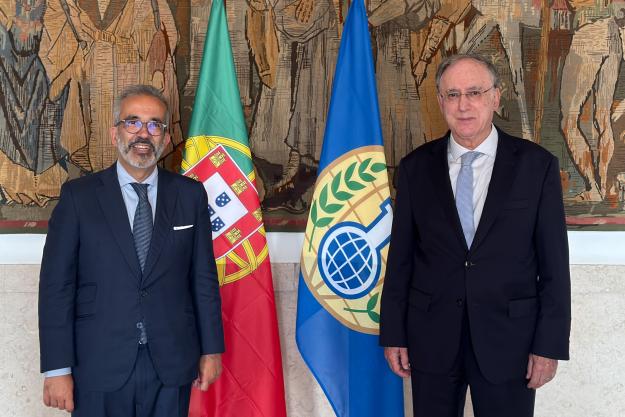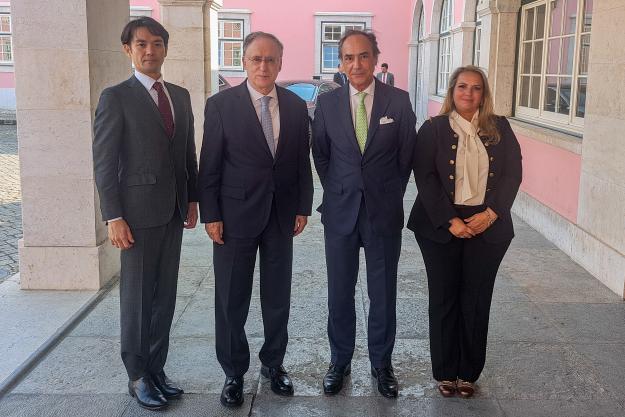
H.E. Mr Paulo Rangel, Minister of State and Foreign Affairs of Portugual, and Ambassador Fernando Arias, Director-General of the Organisation for the Prohibition of Chemical Weapons (OPCW), in Lisbon, Portugual, on 3 June 2025.
THE HAGUE, Netherlands—3 June 2025—The Director-General of the Organisation for the Prohibition of Chemical Weapons (OPCW), Ambassador Fernando Arias, visited the Portuguese Republic on 3 June 2025 and met with the Minister of State and Foreign Affairs, H.E. Mr Paulo Rangel, in Lisbon.
During their meeting, the Foreign Minister and the Director-General acknowledged that the international security environment remains volatile, marked by complex and persistent conflicts. In this context, they agreed that upholding the international disarmament and non-proliferation framework, including the global norm against chemical weapons, is more critical than ever.
Foreign Minister Rangel stated, “Portugal recognises the OPCW’s unique and essential role in today’s world and reaffirms its strong commitment to the Organisation and its mission.”
Director-General Arias provided an update on the OPCW’s latest efforts regarding Syria, stating: “In line with its mandate, the OPCW Technical Secretariat has been pursuing ongoing deployments in Syria. Under the support of States Parties, the Technical Secretariat will continue its efforts to support Syria’s long-term compliance with the Chemical Weapons Convention (CWC).”
The discussions also touched on allegations of chemical weapons use, including riot control agents in Ukraine. In this context, the Director-General briefed Foreign Minister Rangel on the findings of the OPCW Technical Assistance Visits (TAV), which confirms the presence of CS, a riot control agent, along the confrontation line. He also provided an overview on the OPCW Technical Secretariat’s activities to deliver assistance and protection support to Ukraine Under Article X of the Convention, upon its request.

(Left to right) Mitsuhiro Imamura, OPCW Deputy Chief of Cabinet; Ambassador Fernando Arias, OPCW Director-General; Ambassador Afonso Malheiro, President of the Portuguese National Authority; and Dr Sandra Oliveira Saraiva, Permanent Secretary of the Portuguese National Authority, on 3 June 2025.
The Director-General expressed his sincere gratitude to Foreign Minister Rangel for the political and financial support that the Government of Portugal has extended to the OPCW in fulfilling its mandates.
He further stated, “I also commend Portugal’s active role in supporting other members of the Community of Portuguese Language Countries (CPLP) in strengthening their implementation of the CWC, including efforts to implement national legislations and to enhance chemical emergency preparedness to better protect their populations.”
The discussions also addressed the impact of rapid developments in science and technology on the implementation of the Convention, particularly the interaction between chemistry and emerging technologies such as artificial intelligence (AI), which present new challenges and put the relevance of the Convention to the test. In this regard, the Director-General briefed on the OPCW’s work in this regard, aiming to keep pace with advances in science and technology and addressing both the risks and opportunities presented by AI.
Background
As the implementing body for the Chemical Weapons Convention, the OPCW, with its 193 Member States, oversees the global endeavour to permanently eliminate chemical weapons. Since the Convention’s entry into force in 1997, it is the most successful disarmament treaty eliminating an entire class of weapons of mass destruction.
In 2023, the OPCW verified that all chemical weapons stockpiles declared by the 193 States Parties to the Chemical Weapons Convention since 1997 — totalling 72,304 metric tonnes of chemical agents — have been irreversibly destroyed under the OPCW’s strict verification regime.
For its extensive efforts in eliminating chemical weapons, the OPCW received the 2013 Nobel Peace Prize.
